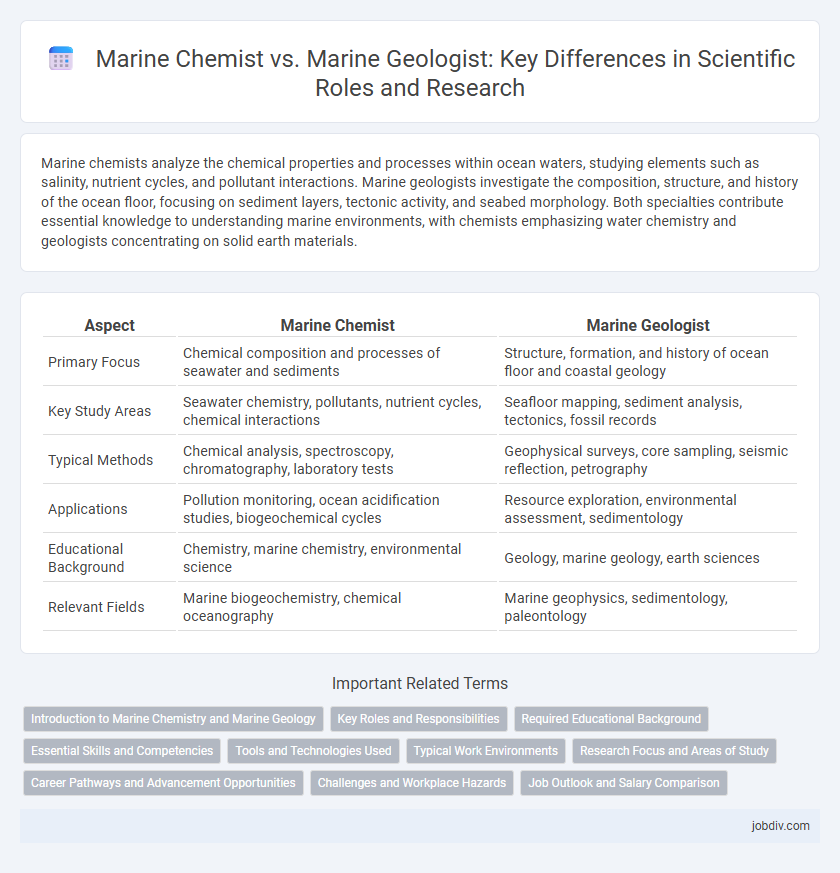Marine chemists analyze the chemical properties and processes within ocean waters, studying elements such as salinity, nutrient cycles, and pollutant interactions. Marine geologists investigate the composition, structure, and history of the ocean floor, focusing on sediment layers, tectonic activity, and seabed morphology. Both specialties contribute essential knowledge to understanding marine environments, with chemists emphasizing water chemistry and geologists concentrating on solid earth materials.
Table of Comparison
| Aspect | Marine Chemist | Marine Geologist |
|---|---|---|
| Primary Focus | Chemical composition and processes of seawater and sediments | Structure, formation, and history of ocean floor and coastal geology |
| Key Study Areas | Seawater chemistry, pollutants, nutrient cycles, chemical interactions | Seafloor mapping, sediment analysis, tectonics, fossil records |
| Typical Methods | Chemical analysis, spectroscopy, chromatography, laboratory tests | Geophysical surveys, core sampling, seismic reflection, petrography |
| Applications | Pollution monitoring, ocean acidification studies, biogeochemical cycles | Resource exploration, environmental assessment, sedimentology |
| Educational Background | Chemistry, marine chemistry, environmental science | Geology, marine geology, earth sciences |
| Relevant Fields | Marine biogeochemistry, chemical oceanography | Marine geophysics, sedimentology, paleontology |
Introduction to Marine Chemistry and Marine Geology
Marine chemistry explores the chemical composition and processes of seawater, including nutrient cycles, trace elements, and pollutant interactions, which are critical for understanding marine ecosystems and biogeochemical cycles. Marine geology focuses on the study of ocean floor structures, sediment analysis, tectonic activity, and the history of Earth's marine environments through geological records. Both disciplines integrate interdisciplinary methods to analyze the ocean's physical, chemical, and geological characteristics, contributing vital insights into environmental monitoring and resource management.
Key Roles and Responsibilities
Marine chemists analyze the chemical composition of seawater and marine sediments to assess pollution levels, chemical cycles, and environmental impacts. Marine geologists study the physical structure and processes of the ocean floor, including sedimentology, tectonics, and seabed mapping, to understand Earth's geological history and marine resource distribution. Both professions collaborate on oceanic research but focus respectively on chemical properties and geological formations to inform marine conservation and resource management.
Required Educational Background
Marine chemists typically require a degree in chemistry, marine science, or environmental science, emphasizing coursework in analytical chemistry and oceanography. Marine geologists usually pursue degrees in geology, earth sciences, or marine geology, focusing on sedimentology, tectonics, and geophysical methods. Both disciplines benefit from advanced studies such as master's or Ph.D. programs to specialize in their respective fields and engage in research.
Essential Skills and Competencies
Marine chemists require expertise in analytical chemistry, focusing on chemical processes within marine environments and proficiency in laboratory techniques like spectroscopy and chromatography. Marine geologists must possess strong skills in geological mapping, sediment analysis, and geophysical surveying to study seabed structures and tectonic activity. Both professionals demand competencies in data interpretation, field sampling, and the application of specialized software for environmental modeling and resource evaluation.
Tools and Technologies Used
Marine chemists employ advanced spectrometers, chemical analyzers, and chromatographs to study the chemical composition of seawater and pollutants. Marine geologists utilize cutting-edge sonar mapping systems, seismic reflection tools, and sediment corers to analyze underwater geological structures and sediment layers. Both disciplines rely heavily on remote sensing technologies and autonomous underwater vehicles (AUVs) to collect precise data from challenging marine environments.
Typical Work Environments
Marine chemists primarily conduct research and analysis in laboratories aboard research vessels, coastal facilities, and marine pollution monitoring centers to study seawater composition and chemical processes. Marine geologists predominantly work in field settings such as oceanographic research ships, coastal field stations, and sediment sampling sites where they investigate seabed structures, sediment layers, and plate tectonics. Both professions often collaborate in interdisciplinary marine research institutes but maintain distinct operational environments tailored to their specialized scientific methodologies.
Research Focus and Areas of Study
Marine chemists specialize in analyzing the chemical composition of seawater, studying nutrient cycles, trace metals, and pollutants to understand oceanic chemical processes and their impact on marine ecosystems. Marine geologists focus on the physical structure, composition, and history of the ocean floor, investigating sediment layers, tectonic activity, and underwater geological formations to reconstruct past climates and geological events. Both disciplines collaborate to provide a comprehensive understanding of marine environments by integrating chemical data with geological context.
Career Pathways and Advancement Opportunities
Marine chemists specialize in analyzing chemical processes and compositions within ocean environments, focusing on pollution, biogeochemical cycles, and water quality, which opens career paths in environmental consulting, research institutions, and governmental agencies. Marine geologists investigate the physical structure, history, and processes of the ocean floor, directing their expertise toward resource exploration, seismic risk assessment, and sediment analysis, often advancing through roles in academia, oil and gas industries, and environmental monitoring firms. Both fields offer progressive opportunities in interdisciplinary collaboration, specialized research projects, and leadership positions in marine science organizations, with advanced degrees enhancing prospects for career advancement.
Challenges and Workplace Hazards
Marine chemists face challenges such as handling toxic chemicals and managing corrosion in aquatic environments, with workplace hazards including chemical exposure and confined lab spaces aboard research vessels. Marine geologists encounter difficulties in collecting sediment cores and mapping underwater geological formations, often working in unstable seabed conditions and dealing with risks like deep-sea pressure effects and equipment malfunctions. Both professions require stringent safety protocols to mitigate hazards associated with marine fieldwork and laboratory analysis.
Job Outlook and Salary Comparison
Marine chemists, specializing in analyzing chemical processes in marine environments, typically earn an average salary of $75,000 annually, with job growth expected at around 8% over the next decade due to rising environmental monitoring needs. Marine geologists focus on studying seabed materials and geological formations, earning slightly higher median salaries near $82,000, supported by a steady 7% job outlook driven by offshore resource exploration. Employment opportunities for both professions are increasingly influenced by expanding marine conservation efforts and offshore energy projects, emphasizing the demand for specialized scientific expertise.
Marine Chemist vs Marine Geologist Infographic

 jobdiv.com
jobdiv.com